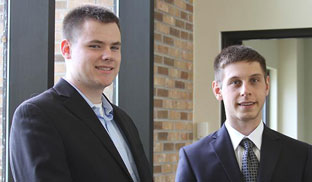
Colonie Central High School Technology teacher Barry Witte shared a story about two of his former students and their recent success at Clarkson University. The two – David Altman and Matthew Craw – working with two other students in Witte’s Engineering Design and Development course (part of the Project Lead the Way sequence) before they graduated, came up with an invention to help senior citizens walk.
As freshmen at Clarkson, they entered their invention in an entrepreneurial design contest usually considered for juniors and seniors in Clarkson’s similar courses. The Colonie students entered their work pretty much as they had left it in high school, without altering significant content. Their level of achievement was so high that they placed second in the competition – with work superior to all but one team all of which were at least two years senior to them. The team was invited to a statewide competition, and even though they did not win there, the have attracted the attention of investors and manufacturers and now they team has incorporated and plans to license their device to a manufacturing company.
This level of achievement is not surprising to their former CCHS teacher. “The Engineering Design class is intended to be a college prep course for students considering a future in engineering, in which students get significant insight into the kind of work they will be doing in college and beyond,” Witte said.
Following is a story about these students’ achievement featured on the Clarkson University website.
Putting a Spring Back in Their Step
By Kristen Schmitt
David Altman never pictured himself as an entrepreneur, especially as a high school senior. But when his grandfather had trouble taking the stairs following spinal surgery, he saw a problem he needed to solve.
“We had a senior project class,” says Altman, who teamed up with Matthew Craw, Andrew Voerg and Kenny Abel – all graduates of Colonie Central High School in New York – to work on the solution. Altman and Craw currently attend Clarkson; Voerg attends the University of Buffalo; and Abel is a student at Hudson Valley Community College. “We decided to develop a way to help elderly people get up and down the stairs, inspired mostly by my grandfather.”
The team’s initial design – a cane outfitted with a safety-bracket system that grips the stair and acts as a second banister for support – was completed as part of their high school senior capstone project. While Altman’s grandfather was the initial market for the first prototype, the team hopes to offer the stair-stepper cane to the entire 65+ demographic, which is why Altman and Craw brought their idea to the Shipley Center for Innovation once they started at Clarkson University.
“We learned that the Shipley Center helps people form companies around a specific idea, so we decided to set up a meeting,” says Craw, a sophomore who plans to major in computer science and complete an MBA in four years.
“They were impressed because we had most of the engineering done,” says Altman, a sophomore majoring in mechanical engineering. “They wanted to help us build up the business side of things.”
Since their initial meeting at the Shipley Center last fall, the team has worked with Jamey Hoose, Robyn Seifert and Kevin MacVittie to form StairSafe LLC, hone their business strategy and file paperwork for a provisional patent. What’s next? Using their winnings from the North Country Business Plan Competition – the second place prize gave them $1,000 in startup capital – to develop a final product prototype that can be mass produced, distributed and sold.
“We’re also in the process of starting a Kickstarter campaign to raise additional capital that we’ll need as we move forward to get approval from the FDA for our product, as well as to obtain a full patent,” says Craw.
The aluminum parts of the cane will be manufactured locally by Northern Machining, Inc.; other pieces will be created using 3D printing. The team plans to use their space at the Peyton Hall Incubator in downtown Potsdam to assemble the first few canes. Altman is also working closely with Clarkson University Civil and Environmental Engineering Senior Specialist Daniel Valyou who will help analyze the structural integrity of the cane.
“That way,” says Altman, “We can make sure that our design is strong enough physically to withstand all the forces and won’t break if someone falls with it.”
They hope to be selling their stair-stepper cane nationwide by their junior year.
“I absolutely believe this is a multi-million-dollar endeavor,” says Craw. “This is going to be something big, and I’m ready for it.”
